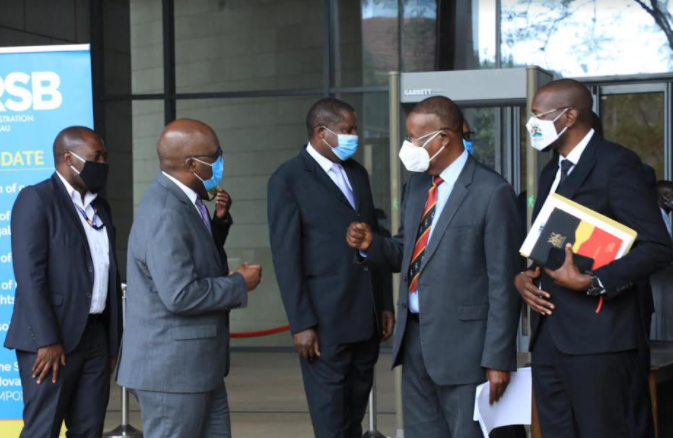The Uganda Registration Services Bureau (URSB) and the Government of Intellectual Property
Uganda have today held a high-level Stakeholder Training on National Intellectual Property Policy (NIPP) as part of the IP policy execution strategy, at the President’s Office, Conference Hall. The training drew representation from various stakeholders involved in the Intellectual Property value chain sector,
including Government Ministries, Departments and Agencies, and development partners.
Prof. Ephraim Kamuntu, the Minister of Justice & Constitutional Affairs represented the Rt. Hon. Ruhakana Rugunda, the Prime Minister as Chief Guest, while Hon. Jackson Kafuuzi, the Deputy Attorney General, and the Registrar General were among the prominent speakers and made presentations.
The training comes on the backdrop of the launch of the National Intellectual Property Policy by HE
President Yoweri Kaguta Museveni on 23 rd September, 2020 after cabinet passed the Policy on 27 th May, 2019. The objective of the NIPP is to stimulate and nurture innovation and creativity for socioeconomic development of the country. The policy will also facilitate integration of intellectual property into national priority sectors and programs towards realization of national development goals.

According to the Directorate of Intellectual Property at URSB, the successful implementation of NIPPrequires a strategic approach that prioritizes key capacity challenges that, if addressed, can unlock the country’s true IP potential.
The deputy attorney general on behalf of the Prime Minister said concerted efforts by all stakeholders will bear results in the protection and nurturing of the country’s creative industry. “There has been a lack of confidence among our innovators in their capacity to unleash their creativity. However, with the implementation of the National Intellectual Property Policy, our creative and innovation sectors will now easily take off.”
The main purpose of the upcoming training will also be to provide direction on short, medium and long-term activities and interventions that will enable IP stakeholders effectively work together towards creating, protecting and commercially exploiting research results, innovations, new technologies and creative works.
The Prime Minister added that it was pertinent to identify key players in IP ecosystems to popularize the policy. “The identification of capacity as a key strategic area has been one of the fundamental missing links with previous development efforts. As such, the implementation of the National Intellectual
Property Policy will be based on a proper understanding of the capacity requirements and accompanied by a Capacity Development Planning Framework.”
The upcoming training participants also deliberated on actionable decisions to be made as well as activities to be undertaken by key stakeholder groups for effective execution of all Intellectual Property Policy activities.











